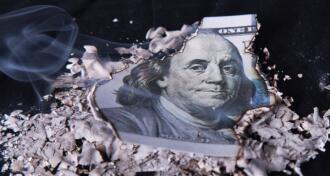Can a debtor discharge a debt arising out of a deliberate or intentional act that causes injury to you?
A recent article addressed the general issue of discharging debts in bankruptcy and various grounds for excepting debts from discharge in Chapter 7. This article focuses on the discharge exception for debts arising out of willful and malicious injuries by the debtor. The United States Court of Appeals for the Fourth Circuit recently reiterated in TKC Aerospace Inc. v. Muhs that such debts may be dischargeable it the debtor did not intend to cause injury.
A Former Employee Goes Rogue
TKC Aerospace Inc. ("TKCA"), an Alaska corporation specializing in aircraft acquisition and logistics, hired Charles Muhs as its Vice President of Business Development. While working for TKCA, Muhs had access to the company's confidential and proprietary information. Muhs' employment agreement prohibited him from disclosing any protected information to any third parties, and also barred him from competing with TKCA for six months following his termination.
During Muhs' employment, TKCA bid on and was awarded various contracts with the United States Department of State ("DOS"). Muhs helped in the contract bidding process, which involved submitting proposals to DOS. Muhs later left TKCA and joined Phoenix Heliparts, Inc. ("PHP"), a TKCA competitor. Muhs helped PHP develop bids and secure a contract with DOS.
TKCA Strikes Back
TKCA sued PHP, but not Muhs, in Arizona state court. The Arizona court entered judgment against PHP for over $20 million, including more than $13.5 million in punitive damages. Attributing Muhs' acts to PHP, the Arizona court determined that PHP engaged in willful and malicious conduct, including misappropriation of TKCA's trade secrets. The court found that PHP and its owners induced Muhs not only to violate his non-compete agreement with TKCA but also to steal TKCA trade secrets for PHP's use. PHP used stolen TKCA proprietary documents to prepare its DOS bid, knowing that it would harm TKCA in the process.
Based on the Arizona judgment, TKCA obtained a judgment against Muhs in federal court in Alaska. Even though Muhs was not a party to the Arizona action, the Arizona court's damages award was based on findings that Muhs provided confidential TKCA documents to PHP and worked with PHP to obtain the DOS contract in direct competition with TKCA. Applying estoppel principles, the Alaska court held that Muhs was bound by the Arizona court decision and barred from relitigating TKCA's claims against him. The Alaska court entered judgment against Muhs for the same amounts as the Arizona judgment against PHP, including the punitive damages award in excess of $13.5 million.
The Bankruptcy Proceedings
Muhs then filed a Chapter 7 case in the United States Bankruptcy Court for the Eastern District of Virginia and sought to discharge the Alaska judgment. TKCA argued that the judgment was non-dischargeable to the extent it arose out of a willful and malicious injury by Muhs. Furthermore, TKCA argued that Muhs should be prevented from arguing that the debt was dischargeable, as the Arizona court and the Alaska court both already determined that the conduct underlying the judgment was willful and malicious. The bankruptcy court agreed, concluding that "the Alaska court's findings satisfy the standard for non-dischargeability" for a willful and malicious injury.
The district court affirmed, noting that the Alaska court awarded punitive damages for Muhs' violation of Alaska's Uniform Trade Secrets Act and that such damages are only awarded in instances of willful and malicious conduct. Therefore, Muhs was prevented from arguing that the debt was dischargeable. Muhs appealed to the Fourth Circuit.
Does Collateral Estoppel Apply?
As the party challenging the dischargeability of the Alaska judgment, TKCA had the burden of proving non-dischargeability. TKCA relied on the Alaska judgment, arguing that there was no meaningful difference in the definition of "willful and malicious" under Alaska law for purposes of awarding punitive damages, and "willful and malicious" under the Bankruptcy Code for purposes of dischargeability. Because the Alaska court already decided that Muhs' conduct was willful and malicious under Alaska law, TKCA contended that Muhs was collaterally estopped from arguing that the Alaska judgment was dischargeable.
But collateral estoppel only prohibits reconsideration of issues actually decided in an earlier proceeding. Among other things, this requires that (i) the current issue is identical to the issue decided in the prior action, (ii) the issue was resolved in the prior action by a final judgment on the merits, and (iii) the determination of the issue was essential to the prior judgment.
Under the Bankruptcy Code, a debt is not dischargeable in Chapter 7 if it arises out of a "willful and malicious injury by the debtor to another entity or to the property of another entity." 11 U.S.C. § 523(a)(6). The United States Supreme Court has held that mere negligent or reckless conduct giving rise to such an injury does not satisfy the "willful and malicious" requirement. Moreover, even intentional conduct resulting in such injury is not enough. Rather, the debtor must have engaged in the conduct with actual intent to cause injury. Therefore, the issue in Muhs' bankruptcy case was not whether his actions were willful and malicious but whether he acted with actual intent to injure TKCA.
Reviewing the Alaska judgment, the Fourth Circuit determined that collateral estoppel did not apply. TKCA failed to show that the meaning of "willful and malicious" under Alaska law is identical to its meaning under the Bankruptcy Code. Therefore, the issue of "willful and malicious" before the bankruptcy court was not identical to the "willful and malicious" issue before the Alaska court. More importantly, the Alaska court never addressed whether Muhs intended to injure TKCA. Because Muhs' intent to injure was not considered by the Alaska court, collateral estoppel did not apply. The Fourth Circuit reversed and remanded to the bankruptcy court.
Conclusion
While Muhs' conduct in this case was willful and resulted in injury to TKCA, this alone was insufficient to deem his debt to TKCA non-dischargeable under the willful and malicious injury discharge exception. Even debts for punitive damages arising out of willful conduct may be dischargeable in the absence of a specific intent to injure. Creditors cannot assume that estoppel will apply and must be prepared to re-litigate discharge issues in bankruptcy court.









